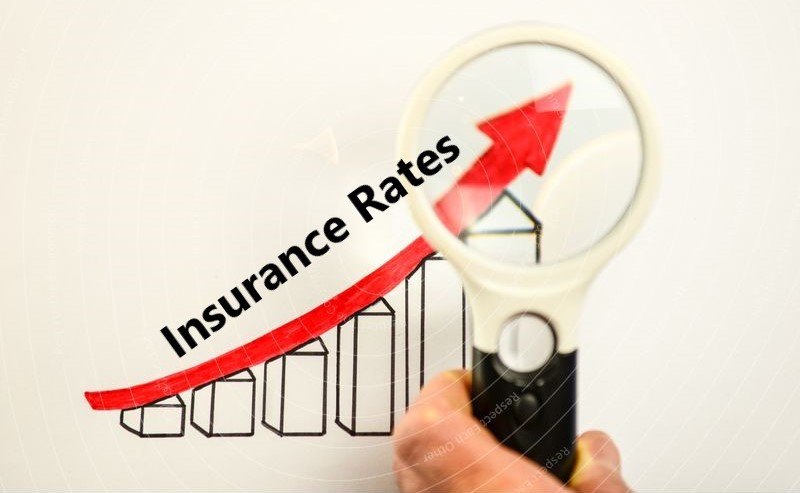Why Did My Insurance Go Up?
At Mile High Insurance Brokers, we work hard to keep your insurance rates down while ensuring you have right and property coverage when you need to file a claim. Unfortunately, 2022 has been one of the most chaotic change in premiums we've seen in recent memory. Like you, we're hopeful that recent rates adjustments means less increases in the near future. However, we're not holding our breathe and thought we'd share our thoughts on why rates keep increasing.
Insurance companies sets insurance rate based on a number of factors, and while you do have some control over what determines your rate — for example, driving history, filing claims, speeding tickets — there are other factors out of your hands. Below are 7 factors affecting insurance rates.
Inflation Is Real
The Consumer Price Index (CPI) has risen more than 7% since 2020. It's the highest it's been in over 40 years. So you're paying about 7% more on all your bills, including auto insurance, than you were a couple of years ago.
Vehicle Parts Are Also Increasing I Price

Inflation is hitting the auto industry hard. Though the average increase is 7%, inflation for vehicle parts is closer to 10%. An increase in vehicle parts means your insurance will need to pay more to repair your car.
Repair Costs Have Gone Up 20%
Repairing your car costs more thanks to supply chain issues, the labor shortage, and new vehicle features made with expensive technology. The issues in the supply chain and available labor can also cause repairs to take longer. That means you could be in rental vehicles longer, placing a strain on your insurance company through the cost of claims. A simple fender bender with a newer car, equipped with new safety technology, like rearview cameras or sensors, can cost much more than a fender bender with an old car. These complex designs in cars mean more costly materials and expensive repairs.
Cars Cost More Now
Used car prices have skyrocketed 27% since 2021. And new car prices have gone up more than 14%. Pricier cars mean higher auto insurance premiums.
People Are Driving More, Causing A Spike In Accidents
People weren't driving as much in 2020 and 2021 because they stayed home more. That meant less wear-and-tear on their vehicles and also fewer accidents. Now, more motorists are on the road, leading to more car crashes. Sadly, these accidents are also becoming more severe and causing more fatalities.
While many modern cars come with advanced features to improve driver safety, recent numbers show it is not enough to curb the spiking death rates from car accidents. According to an NHTSA's study, an estimated 31,720 people died in car crashes during the first nine months of 2021. This was a 12% increase from the 28,325 car accidents during the same timeframe in 2020.
Uninsured Motorist
You might be a great driver who avoids accidents and tickets year after year, but factors like the above, not to mention things like costlier accidents, insurance fraud and no-fault policies, are likely causing a rise in your insurance rate. Car insurance is legally required in almost every single state, but that doesn't mean there aren't drivers on the road without insurance.
While the number of uninsured drivers on the road has decreased over the last decade, according to the Insurance Research Institute, the amount of uninsured claims that insurance companies are paying continues to rise. And though it doesn't seem quite fair, your car insurance rate may increase due to these costs.
Mother Nature
With natural disasters occurring more frequently over the last decade, car insurance companies are receiving more claims than years before. Comprehensive coverage protects you from weather disasters such as hail storms, floods, tornadoes — which is favorable for you — but insurance companies are paying billions of dollars each year for car damages due to weather related incidents.
Insurance companies have cited higher payouts because of more damaging hail storms and wildfires as a key driver of premium inflation. For example, the Marshall fire destroyed 1,084 homes worth more than $500 million in Boulder County on Dec. 30, which is way beyond the normal fire season.
Another big driver of late has been replacement costs. Home prices in Colorado have risen sharply since lockdown orders were lifted in 2020. As of May, they were going up more than 23% a year in metro Denver, per the S&P Case-Shiller Home Price indices. But what insurance companies look at more closely than a home's market value are the costs to replace it. Because of supply-chain difficulties and worker shortages the costs for building materials and construction labor have skyrocketed since the pandemic.
Is There A Solution?
Communicating with your agent is key. While we do our best to get to know you, document important facts, and ensure you're getting every possible discount. Experience has taught us that things are always changing and by staying in touch with your agent your way more likely to not miss out on an opportunity to save. Because we're a broker, we're able to check rates with multiple carriers. This allows us to move your insurance when a better rate is available without you having to establish a new relationship with another agent. If available, participate in telematic tracking. However, beware that with some carriers poor driving habits can increase your rates. Maintain a good driving record. Explore payment options. Paying in full can often get you up to a 12% discount. And finally, try to improve your credit score.
If your rates recently increased feel free to contact us. We'll do our best to lower your rates.